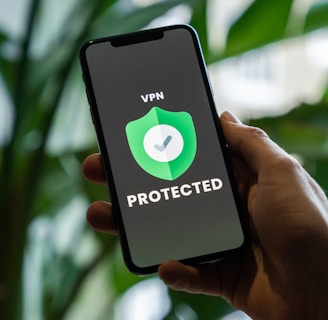The ultimate guide to cybersecurity: Protecting your Digital World
The Ultimate Guide to Cybersecurity: Protecting Your Digital World Introduction to Cybersecurity
Mr Rajib
2/18/20254 min read
The Ultimate Guide to Cybersecurity: Protecting Your Digital World
Introduction to Cybersecurity
In today’s increasingly connected world, cybersecurity has become more important than ever before. With the rise in digital transactions, online communication, and cloud computing, individuals and businesses are more vulnerable than ever to cyber threats like hacking, phishing, malware, and data breaches.
Whether you're a business owner or an everyday internet user, understanding cybersecurity basics is essential to safeguarding your digital world. In this guide, we’ll explore why cybersecurity matters, how to protect your personal information, and best practices to defend against cyber attacks.
Why Cybersecurity is Important
Cybersecurity refers to the practices, tools, and measures used to protect digital information, systems, and networks from unauthorized access, attacks, and damage. Without effective cybersecurity, you risk losing sensitive data, compromising your privacy, or even facing significant financial losses.
Key Cybersecurity Risks:
Phishing: Cybercriminals attempt to deceive individuals into revealing personal information like usernames, passwords, and credit card details.
Ransomware: Malicious software that locks you out of your system or files until a ransom is paid.
Malware: Any type of software designed to cause harm to your system or steal information.
Data Breaches: When attackers access confidential data, such as personal or financial information, and exploit it for illegal purposes.
How to Protect Yourself: Top Cybersecurity Tips
1. Use Strong, Unique Passwords
One of the simplest and most effective ways to protect your online accounts is by using strong passwords. Avoid using easily guessable information, like birthdays or common phrases. Instead, create passwords that are a combination of uppercase and lowercase letters, numbers, and special characters.
Tip: Consider using a password manager to securely store and manage your passwords, so you don’t have to memorize each one.
2. Enable Two-Factor Authentication (2FA)
Two-factor authentication (2FA) adds an extra layer of security to your accounts. With 2FA, you’ll need to provide a second form of identification (such as a text message code or an authentication app) in addition to your password. This significantly reduces the risk of unauthorized access.
3. Regularly Update Your Software
Cybercriminals frequently exploit vulnerabilities in outdated software. To keep your system secure, regularly update your operating system, browsers, antivirus programs, and other software. Enable automatic updates wherever possible to ensure you're always running the latest version.
4. Be Cautious with Emails and Links
Phishing emails and malicious links are common tactics used by cybercriminals to steal information. Be cautious when receiving unsolicited emails, especially those that ask you to click on links or download attachments. Always double-check the sender’s email address and avoid clicking on links if you’re unsure about their authenticity.
5. Secure Your Wi-Fi Network
Make sure your Wi-Fi network is encrypted and requires a password to access. Use WPA3 (Wi-Fi Protected Access 3) encryption for the highest level of security. If you're working from home, ensure that no one can easily access your network without your permission.
6. Backup Your Data Regularly
Data loss can occur for various reasons, from hardware failure to cyber attacks. Protect your files by regularly backing up your data to an external hard drive or using a cloud storage service. This ensures that even if you fall victim to a cyber attack, you won’t lose important files.
Advanced Cybersecurity: Protecting Your Business
While individuals need to be aware of online threats, businesses face more advanced and complex cybersecurity challenges. For businesses, a data breach can result in reputational damage, loss of customer trust, and significant financial costs. To protect your organization, here are some advanced cybersecurity tips:
1. Implement a Strong Firewall
A firewall acts as a barrier between your internal network and the internet, preventing unauthorized access to your system. Ensure that your firewall is properly configured and regularly updated to defend against cyber threats.
2. Conduct Regular Security Audits
Perform regular security audits to identify potential vulnerabilities in your systems. You can either do this in-house or hire a professional cybersecurity firm to conduct comprehensive penetration testing and vulnerability assessments.
3. Train Your Employees on Cybersecurity
Your employees are your first line of defense against cyber threats. Provide them with regular cybersecurity training on identifying phishing attempts, using strong passwords, and following best security practices. The more knowledgeable your team is, the better your business will be at avoiding security breaches.
The Role of Cybersecurity in the Digital Age
With the growing reliance on digital technology, cybersecurity will continue to be a critical concern. As we move further into the digital age, we’re witnessing new and sophisticated cyber threats, making it even more essential for individuals and businesses to stay vigilant.
Emerging Cybersecurity Trends:
AI in Cybersecurity: Artificial Intelligence (AI) is increasingly being used to detect and mitigate cyber threats in real-time.
Zero Trust Architecture: This security model assumes that no user or device, whether inside or outside the network, should be trusted by default.
Cloud Security: As more businesses move to the cloud, securing cloud environments is becoming increasingly important.
Conclusion
Cybersecurity is not just about protecting your devices—it’s about protecting your personal information, your privacy, and your digital assets. Whether you're an individual or a business, taking the necessary steps to secure your digital presence will help you avoid costly and potentially disastrous attacks.
At CyberSecInsights, we aim to keep you informed on the latest trends, tools, and tips in cybersecurity. Stay tuned for more articles, updates, and expert advice to ensure your online safety.
Call to Action:
If you found this guide helpful, don't forget to subscribe to our newsletter for the latest cybersecurity news, tips, and tutorials delivered directly to your inbox. Stay safe online!


